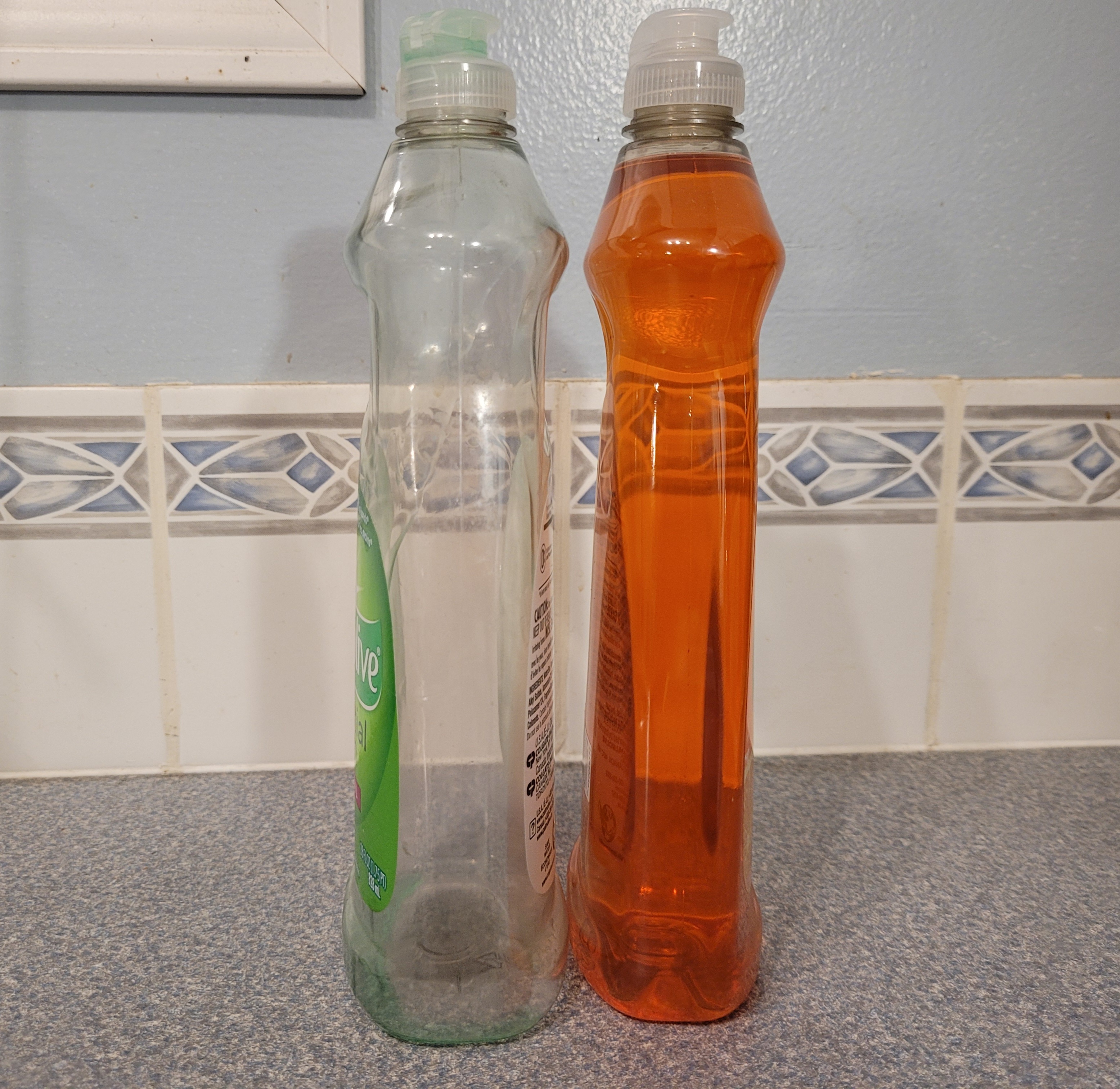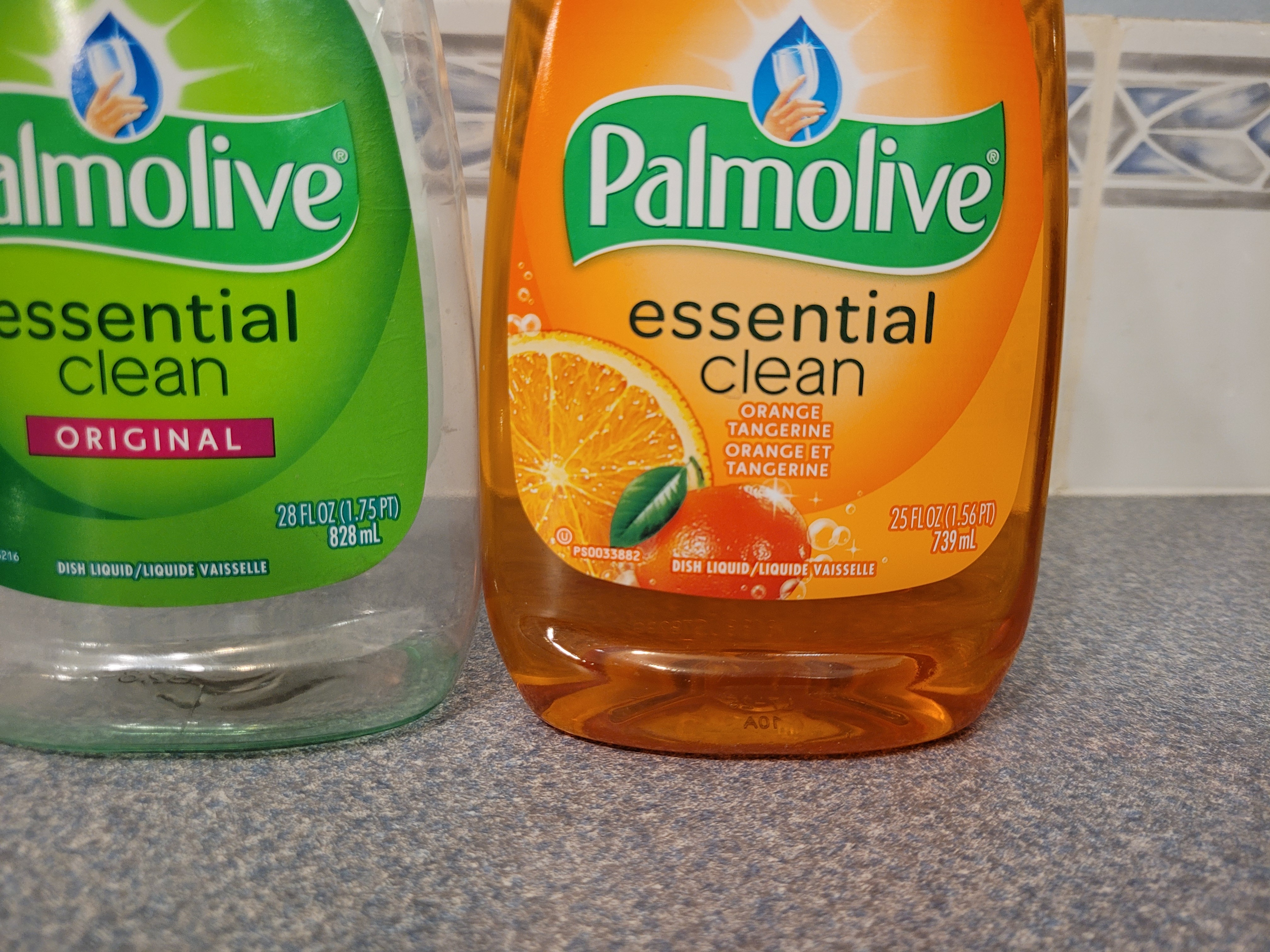They’re careful to make sure the bottle still looks the same from the front, but from the side you can see the difference.


Go to your local restaurant supply place and go buy the 1 gallon jug instead for half the price.
Great idea, I’ll just drive 4 hours to my local restaurant supply store for some dish soap.
How far in the middle of nowhere do you live that it’s 4 hours from a restaurant supply store???
Idk, but we have one 30 minutes or so away. Need a restaurant license or some shit to shop there.
Not our fault you live in the middle of nowhere, dummy.
Sounds even better if you don’t have a car like me.
Gotta look it up.
https://www.superc.ca/en/aisles/household-cleaning/dishwashing/dishwashing-liquid
591mL Palmolive: $0.48/100mL 4.27L Palmolive: $0.25/100mL
Damn, good find! I think I’ll get me one of these and transfer it into those new upside down ketchup bottle style dish soap bottles.
I get mine at Smart & final. The pink hand soap like you get in a public restroom, and blue dish soap. Easy n cheap as hell.
Really need a law that if the amount, or recipie changes it is notified on the packaging for… 3 months?
I’d say for twice the expected usage time of the original packaging.
Say on average someone goes through the original bottle once a month (yes that is way too much usage, just as a hypothetical), they should be required to have it prominently displayed on the new label that the new size is estimated to last x% less time(or more time) than the previous packaging, for 2 months minimum.
I’m cases of recipe changes I think it should be required to have that on the packaging as well. I could see a soap mfg just diluting the soap to meet the volume, and bypass the requirement.
deleted by creator
“why hfcs is actually better for you than sugar: get the facts” hitting national news at 9…
The plant-based proteins in this product have been replaced with fiberglass insulation and/or rat poison.
the amount of sawdust in this product has increased from 15-25% by volume
deleted by creator
deleted by creator
deleted by creator
As someone with all: YES PLEASE!
Companies changing their recipes and ingredients while barely or even not changing their packaging has almost killed me at least twice now. And no doubt there have been several other “mystery reactions” that I’ve blamed on housemates not washing chopping boards, but could have been a product recipe change I didn’t notice at that specific time.
It’s been getting so much worse. One of the things I’m allergic to is potato, which is a supper common ingredient to be used when a company uses “skimpflation” to increase profits. Changing the ingredients and quality of ingredients, and manipulating the recipe to be cheaper to make, but not entirely noticeable to the public - maybe use a health-focused or other marketing strategy “now with less carbs” to hide that swapping half the wheat flour for wheat fibre was an entirety profit driven choice.
Potato is cheap and versatile. In the last 10 years I’ve lost entire catagories of products to brands adding unnecessary potato. From sachets of cup-a-soup to canned soup where potato is a great cheap thickening agent to pesto pasta sauce where most brands in Australia contain potato flakes as a binder. I’m allergic to tomatoes too so pesto pasta used to be my life saver at Italian restaurants, But no more. I’m not safe with sweet products either, potato flour is a cheap way to cut wheat flour in cookies and cakes, potato starch can thicken puddings and custards while conveniently making your product gluten free (so you can save money on ingredients, And charge more for being a “allergen friendly food”)
My favourite brand of rice pudding is actually what first drew my attention to the issue with recipe changing and packaging not changing. I bought 2x two packs on the same day, got home and halfway through the week had an allergic reaction after dessert. I double checked the ingredients and because I still had the old pack sitting in the recycling bin I could directly compare while I waited for my boyfriend to bring the car around so we could go to the hospital.
It’s gotten to the point where I’m paranoid enough that I’m checking the same ingredients list 3 times - in the store before I buy it, at home when I pull it out of the pantry, and when I’m standing over the trash can about to throw the packet away, or when I’m pulling it out of my lunch box about to eat it, after already having checked it as I was putting it in my lunch box.
I wonder if you could go to the CBC with your story, that seems like a serious concern that needs to be addressed. It’s not fair to you or anyone with “unusual” allergies.
Man that would be great but you know these companies are just gonna claim its an entirely different product to get around that
I feel like if we had an independent crowd sourced site or something to track these it would have better visibility
I agree that companies would try to get around it, but that’s what government agencies are for, and the fact they will try and Weasle out of it doesn’t mean we shouldn’t try
I feel like openfoodfacts could be relevant to that - there are a lot of non-food grocery items tracked like dish soap. But yeah the main challenge would be tracking sku changes since openfoodfacts is based on barcodes. But the openfoodfacts database would be a good starting point since it has lots of data like container size and stuff.
One possible way to track it would be to show a banner on any item that has had a recent quantity change. If a new sku is introduced, they could track when one product code replaces another, and show a similar warning (or if that is too hard to track, a warning when a sku is newer than x months would alert you so that you don’t mistake it for that product you’ve regularly bought for years).
Either way I’m not sure how it would be made low friction enough to be practical since openfoodfacts requires you to scan each items barcode to see details, unless you had like AR glasses that auto scanned products and showed warnings from openfoodfacts.
Nobody would visit it. If you entered products that you use to get a notification when it is changed, then someone would just hack the database and sell it to Informatica.
I remember something like that happened for toilet papers in Brazil many years ago. Many brands reduced the roll length and there were an outcry among the people. In the end a law was created to do exactly that what you said, but this didn’t stopped companies to continue shrinking products
Here is an example with the warning in yellow
They would just write “new look same great product!” on it and the FDA would be like aiiiight cool.
It’s “fun sized!”
Forever!
“Now 30% less for the same price!”
I liked the shop towel rolls we buy came in the same box and the OD of the rolls was the same, but the cardboard tube in the middle was 50% wider, so you ended up with about 30% less towels on a roll.
Fucking shitbirds.
This is an obvious change. Some time ago I noticed a much more subtle change in the dish soap I normally use(d): The manufacturor only inreased the diameter of the hole in the cap where you squeeze out the dish soap, resulting in a higher consumption of that product, because you are used to squeeze with the same force. This way you are expected to buy more frequently, because it lasts not as long as before. When I discovered it, I changed the product.
We put our dish soap in a hand pump. Problem solved.
In a world where we should be using less packaging this sort of practice just increases more waste.
Once again demonstrating that corporations don’t give a fuck about anything except constantly increasing their profit.
The customer doesn’t matter. The survival of the planet doesn’t matter.
As long as profit increases every single quarter the world could burn for all they care.
In general I agree this is a true statement, but for this particular bottle it is blow molded from the same preform and so weather they blow the shape narrow or wider it is same amount of plastic. But you obviously buy more bottles due to less soap.
Yes. My point was you now need to buy more frequently. So producing more wastage.
Seventh generation that we use went down from 25oz to 19oz.
Same thing happened to my deodorant. I looked at the shelves recently, and ALL the deodorant was now the same redesign, down to the gram.
I’m convinced that theres actually like 4mm of deodorant in these friggin tubes anymore. I just bought my deodorant, and it’s already showing the bottom.
I’m 70% sure they made the deodorant stick shorter on the inside too. It seems to run out way faster now. Same bottle, much more single use plastic thrown in the landfill…
Did the Original flavour shrink too, or just the Orange tangerine? Before I was purchasing in bulk, I sometimes noticed the nicer flavours came in smaller volume than the basic/original for the same price. Not defending the company by any means, I’m just curious.
Excuse me, flavour?
Just thinking out loud but you might want to swap ‘scent’ for ‘flavor’. I’m legitimately concerned you drink this stuff…
Need less bc it’s better smelling, right?
Shrinkflation…yay
3oz smaller. Bastards!
deleted by creator
Shrinkflation is the term the news uses
Volume is an illusion, I can never tell how much anything is by the size of the bottle anyway.
You’re being downvoted, but I think its because of how you said it, rather than what you meant.
It’s actually very true that human brains often do poorly at understanding volume.
I used to work in a bar, and we had two different shapes of glasses. One was shorter than the other but slightly fatter. Both glasses held exactly 1 pint, but customers always thought the shorter glass was smaller.
And that is exactly the point.
Manufacturers are depending on psychological tricks like these to give a false impression of how much product they are selling, and it works.
That’s why we should look at the labels.
That’s why we have labels telling you the volume
Show me one ounce vs one and half ounces.
1 Oz, 1.5 Oz
In container size of what you think you need and it’s very expensive.
You asked them to show those weights when they were talking about labels. So they are absolutely right.
True, but if the bottle looks the same as it used to without looking really close, you’re likely to think it is the same as always whether you know the original volume or not.
I’ve long made comparisons and purchase decisions by the unit price. This kind of thing can blindside me when ordering online though, if it’s a product I get regularly and I don’t happen to catch the change. Hopefully they won’t try to keep the picture the same, but I know in the past they’ve lagged on updating them for packaging changes that didn’t affect the product so they can probably get away with that easily in this case as well. :/
I find it most problematic when I’m trying to figure out how much to get so I don’t get way too much or too little.
Open the new one. It’ll fatten up when it sucks in some air.
That would be the comparison to make. I want to see how they shaved 3oz. off when the bottles look nearly identical. Betting it’s mostly in the top.
I’m not one to be cynical and see evil shit everywhere I look. Some decisions that look bad on the surface were made for reasons we’re not privy to.
THIS shit however… Someone said, “We’re going to shave 10.7% off to raise profit. But we gotta design the smaller bottle so no one will notice. Oh, and we have to retool the manufacturing lines.”
And then someone make a spreadsheet calculating the retooling cost and when it’s expected to be recovered from the extra profit.
Literally read the volume printed on the bottle.
Their point was that they didn’t redesign the package to make it slimmer because that would have cost way more to do than just filling the same bottle with less liquid.
I actually work in a food packaging place and you’d be surprised at how easy and simple it is to make these adjustments. That said, at least it’s not as dumb of an argument to make.
I’m amazed (yet not surprised at all) how this wasn’t the top and only comment to such a dumb post.
It says right on the front that there is 3oz less product.
You and the downvoters didn’t read the whole comment? I’m well aware of the 3oz. difference. There’re numbers and everything!
These bottles are blow molded to loose tolerances at huge volume, not injection molded or milled to tight tolerances at low volume. The cost of changing up the manufacturing lines for this is not much










